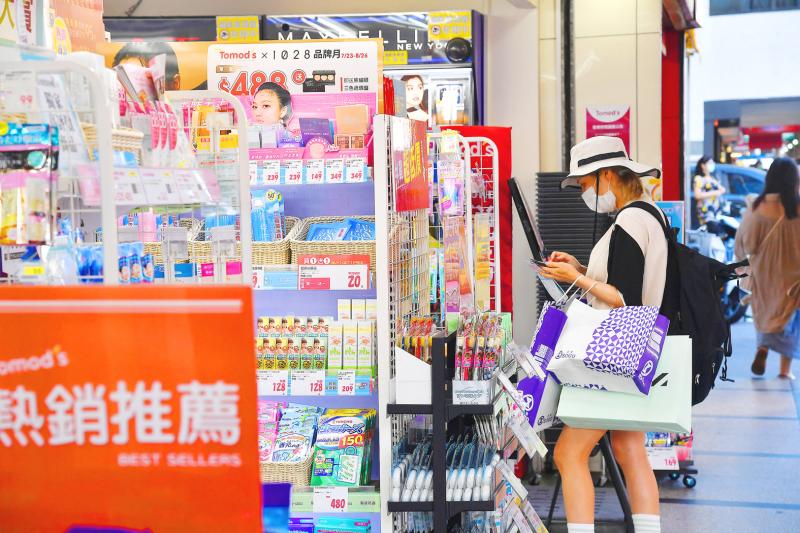The consumer price index (CPI) last month declined 0.52 percent from a year earlier, as cheaper oil products continued to push down transportation costs and businesses cut prices to stimulate sales, a report released yesterday by the Directorate-General of Budget, Accounting and Statistics (DGBAS) said.
It is the sixth consecutive month that the inflationary gauge posted a retreat, but the agency dismissed concerns over deflation, saying that the pace of contraction is slower than June’s revised 0.77 percent decline.
“International oil prices have stabilized and might gain considerable traction moving forward as demand picks up,” DGBAS Senior Executive Officer Chiou Shwu-chwen (邱淑純) told a media briefing in Taipei.

Photo: CNA
The purchasing managers’ index (PMI) for US manufacturers last month improved further from 52.6 to 54.2, which would help fuel consumption, Chiou said.
PMI values above 50 suggest an expansion, while readings below the threshold indicate a contraction.
Transportation and communications costs last month fell 5.09 percent, as international oil prices dropped 18.41 percent from a year earlier, while telecommunication charges fell 3.26 percent, the report said.
Education and entertainment costs fell 1.94 percent, as hotels cut room rates by 12.04 percent, and theme parks and other entertainment venues lowered admission rates by 17.96 percent to attract customers, it said.
Their strategy seems to have paid off, as visits to tourist attractions and shopping activity spiked, backed by the government’s Triple Stimulus Vouchers, Chiou said.
Clothing prices increased 1.57 percent as retailers offered fewer discounts on summer garments, while miscellaneous items increased 1.34 percent as jewelry and accessories grew more expensive, the report said.
Health and medical expenses rose 0.86 percent to reflect upward adjustments in registration fees and copayments, it said.
Food costs inched up 0.78 percent, as higher fruit prices canceled out lower vegetable prices, it said.
Core CPI — a more reliable long-term tracker of consumer prices because it excludes volatile items such as vegetables, fruits and energy — posted a 0.14 percent increase, affirming stable prices, Chiou said.
The wholesale price index (WPI), a measure of production costs, shrank 9.15 percent, narrowing from a revised 10.39 percent decline a month earlier, the agency said.
Export prices softened 3.86 percent in US dollar terms, while import prices shed 7.14 percent, favorable for a trade surplus, it said.
For the first seven months, the CPI edged down 0.27 percent, while the WPI fell 8.34 percent, it said.

Stephen Garrett, a 27-year-old graduate student, always thought he would study in China, but first the country’s restrictive COVID-19 policies made it nearly impossible and now he has other concerns. The cost is one deterrent, but Garrett is more worried about restrictions on academic freedom and the personal risk of being stranded in China. He is not alone. Only about 700 American students are studying at Chinese universities, down from a peak of nearly 25,000 a decade ago, while there are nearly 300,000 Chinese students at US schools. Some young Americans are discouraged from investing their time in China by what they see

MAJOR DROP: CEO Tim Cook, who is visiting Hanoi, pledged the firm was committed to Vietnam after its smartphone shipments declined 9.6% annually in the first quarter Apple Inc yesterday said it would increase spending on suppliers in Vietnam, a key production hub, as CEO Tim Cook arrived in the country for a two-day visit. The iPhone maker announced the news in a statement on its Web site, but gave no details of how much it would spend or where the money would go. Cook is expected to meet programmers, content creators and students during his visit, online newspaper VnExpress reported. The visit comes as US President Joe Biden’s administration seeks to ramp up Vietnam’s role in the global tech supply chain to reduce the US’ dependence on China. Images on

New apartments in Taiwan’s major cities are getting smaller, while old apartments are increasingly occupied by older people, many of whom live alone, government data showed. The phenomenon has to do with sharpening unaffordable property prices and an aging population, property brokers said. Apartments with one bedroom that are two years old or older have gained a noticeable presence in the nation’s six special municipalities as well as Hsinchu county and city in the past five years, Evertrust Rehouse Co (永慶房產集團) found, citing data from the government’s real-price transaction platform. In Taipei, apartments with one bedroom accounted for 19 percent of deals last

US CONSCULTANT: The US Department of Commerce’s Ursula Burns is a rarely seen US government consultant to be put forward to sit on the board, nominated as an independent director Taiwan Semiconductor Manufacturing Co (TSMC, 台積電), the world’s largest contract chipmaker, yesterday nominated 10 candidates for its new board of directors, including Ursula Burns from the US Department of Commerce. It is rare that TSMC has nominated a US government consultant to sit on its board. Burns was nominated as one of seven independent directors. She is vice chair of the department’s Advisory Council on Supply Chain Competitiveness. Burns is to stand for election at TSMC’s annual shareholders’ meeting on June 4 along with the rest of the candidates. TSMC chairman Mark Liu (劉德音) was not on the list after in December last